#that that that
Explore tagged Tumblr posts
Text

BLACK IRIS
「That That That」
Single
Mix
0 notes
Text
well not to be an orbit but consider me flipping that

6 notes
·
View notes
Text
I need this loona album to come out rn this is gonna be the longest 4 days ever
0 notes
Note
omg omg omg omg good luck!!!! I know u r gonna ace this test 😼😼
omg thank you aiabaiabs I'm gonna ace it just because you told me
#☁️. chat#WAIT HOLD ONAUABUABSIS#I'M TOO AIANIAIA SURPRISED#THAT THAT THAT#IA AIABA IT ABSUS#I LOVE YOUR DOC YUTA FIC AND AND#ISBSUSBSUSBSUS I'm gonna#SCREAMMMMMM
2 notes
·
View notes
Text
Getting three of the same words in the row using proper English grammar?
I realized as soon as I typed that that that was unlikely.
41 notes
·
View notes
Text
A look at: AP BIO S3EP6, “That That That”
So this post is going to be sort of an... in-depth analysis for this episode. I hope people enjoy reading this! It’s a long one, so I apologize in advance. I hope it doesn’t feel rambly.
So the episode opens up with the janitor talking with some rats.
We are treated to a shot from their point of view, as the man talks about the rats’ plead about how they’re “going to change”, and how they say they’re not “going anywhere”. Through this simple quick scene, the episode sets up the entire premise, both on a literal level, with the use of rat poison later on, and on a thematical level, introducing us to what’s going to become, by the end of the episode, Jack’s own point of view. Putting it like this, it’s like already the show is drawing a parallel, making us further empathize with Jack as he slowly starts feeling like a rat stuck in a maze himself.
As we’re introduced to Jack, he talks about preparing a recorded lecture for the University of Wisconsin on trascendentalism.
Jack feels sure that what he wants is to get away from the school he’s in, that he won’t miss anything. He thinks this job is what he wants.
Now, trascendentalism is a philosophical movement that values the importance of subjective intuition, not reached through logic but through imagination. It preaches that people deep down already know what’s right for them, that the individual’s potential is limitless, and that the ego is not your true self. All themes that are slowly woven into the episode as Jack works through his subconscious while high off rat poison to come to the conclusion that he already knew deep down was right, and that he started feeling right at the start when people started questioning him.
As this process begins, he goes to talk to Lynette, his girlfriend. He brings up said lecture that he’s recording, it almost feels like he’s seeking her reassurance.
After that, we see him in the teacher lounge, kind of minding his business.
The scene starts out with the three teachers talking. In the frame, catching my eye immediately, is that fourth empty chair. It underlines that someone’s missing, someone that could be a part of what’s happening.

Eventually we cut back to Jack being in frame, except not really, because he starts out of focus, in the backgroung, listening in to the three teachers, framed like an outsider. This is to show us how he feels in the environment.

Then, as he enters the conversation, he gets into focus.
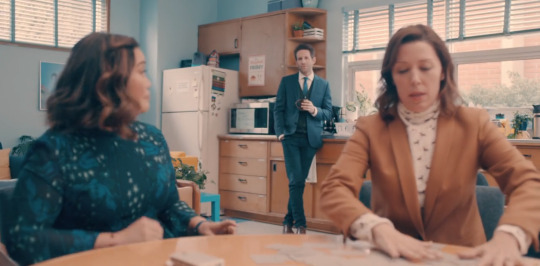
And we then cut back to the three of them.

There is a purposeful distance felt between the two parties, and it’s one that Jack is establishing by keeping himself to the side. This calls back to the themes of the episode right before this, Mr. Pistachio. They’re inviting him in, there is a place for him, but he feels like he doesn’t belong, he stays distant.
As the girls start talking to each other again, Jack is once again kept out of focus, but still clearly in the middle of the shot, which tells us we should still be paying attention to him.

And pay attention to the visual hierarchy, as well. With Jack pushed to the background, he appears small in comparison to the other figures who are big and overpowering. The full body shot, as he resists getting closer to them, almost feels revealing. Emotionally, what this communicates to us, to me personally, is a deep sense of vulnerability that Jack is feeling.
As he subconsciously starts to doubt where he truly wants to be, he feels exposed and out of place.
After this scene, Jack goes to talk to Durbin, and this is where we’re introduced to yet another small subplot that serves to reinforce the themes of the main one at hand.
Durbin is presented with an issue. He wants to tell his brother that he loves him, he has struggled with it in the past, and this is the week he is gaining the courage to do it. This plot will ultimately end up reflecting Jack’s own epiphany, but we’ll get there.
So finally, it’s late evening, school’s empty, and Jack has prepared the set up to record the lecture.
Visually we’re introduced to this duality of Jack on the screen of the ipad versus the real Jack trying to give a lecture. The perfect competent appearance that actually masks his doubts and hesitation.

Screens being often used in media to show something perfect, fake and unachievable, and this is no exception.
Jack starts its lecture:
“To achieve its perfect form, a caterpillar must withdraw and complete itself alone, in its cocoon. Likewise, for us to achieve spiritual perfection, in the view of trascendentalists like Henry David Thoreau, it is necessary to retreat from the mindless and negative influences of society.”
This ends up being exactly what Jack does, as the rat poison induced trip lasts him an entire week, stuck alone in school, with nothing but his delusional and hallucinatory thoughts, he is forced to confront himself in complete solitude to come to the conclusion that was inside him.
He then commits a mistake, right at the end, calling Henry David Thoreau “Justin Thoreau”, the same way Mary, the teacher, did before. In a way, the school and the people in it are rubbing off on him, their presence in his mind manifests through this lapsus, effectively keeping him from completing the lecture correctly. Keeping him here.
He starts stumbling. He starts doubting himself.
“Is that right?”
He asks, the question resonating bigger than just about his current speech, feeling more like about his path in life and his actions.
A shot quickly zooms in on the camera lens, the frantic pace communicating anxiousness, but this shot in particular serves to fully immerse us in Jack’s shoes.
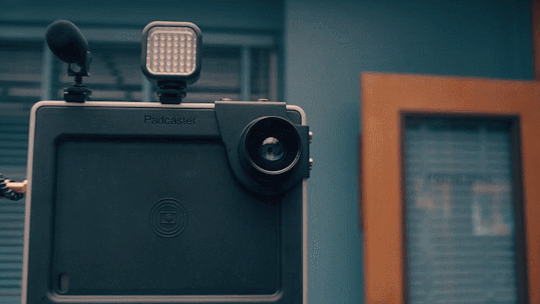
Feeling watched, feeling judged, scrutinized. Having to directly face his shortcomings, unable to blame anyone but himself, and having to ask himself why. The camera almost literally backing us - therefore, Jack - into a corner by coming this uncomfortably close to us.
He attempts to hype himself up and tries again. The whole thing accompanied by a background music that’s basically nothing if not ticking (like a clock) and percussion. It feels quiet and tense.
We then get another shot that’s a clean transition from the screen to the real Jack. In the screen, he appears confident, but as soon as the camera focuses on the real Jack, he loses tracks of what he was saying and once again struggles. Quietly, he turns to look at the background.
He slowly, tentatively reorganizes a single book, then positions himself back, only to turn again towards the bookshelf, still dissatisfied.
Without a single line of dialogue, this shows us precisely what he’s feeling and lets us understand his slow descent into madness. He feels that there’s something wrong, out of place, something that must not be right, but he’s not yet looking at himself to fix this problem, instead he’s looking at his surroundings, trying to gather back the control that he feels he’s rapidly losing by attempting to control what’s around him.
And so he deeply cleans the entire office, reorganizes and color codes the books behind him.
Being introduced to his struggle before the rat poison even starts to affect him lets the transition between reality and hallucination feel seamless, so much so that during a first viewing we start to doubt what’s real and what’s fake, and when.
The overall eerie tone of the episode makes it feel like a take on psychological horror, as the slow loss of control is accentuated by increasingly bizarre events that go completely unquestioned.
Attempt after attempt, we feel as though we are entering a loop with no chance of escaping. Which is exactly what Jack feels.
We then get this.

Jack is fixating on his issue, without much success in resolving it. He’s facing and confronting it over and over. Visually, it’s made bigger than himself by its oppressive presence in the frame.
The only soundtrack accompanying this is a kind of vibration, a deep and hard to hear sound that just looms in the background. This episode in general is very quiet, which helps the atmosphere feel lonely and tense.
He screams, but there’s no one who can hear him. It’s just himself.
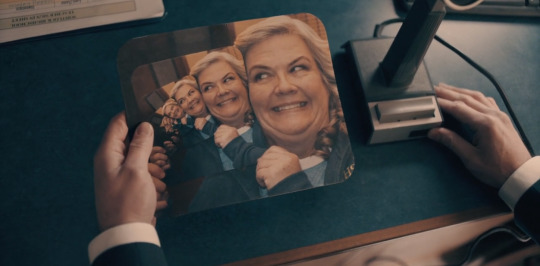
He sees this mouse pad and once again the picture visually reinforces this sense of looping, of feeling stuck and trapped in a repeating endless cycle.
He tries to rip it in half. But he can’t.
Just as he can’t overcome what he’s struggling with, his own cycle that he’s stuck in. He wants to break free, but he’s not sure from what. Is his prison this school he says he hates so much, or is his prison his own ego, trapping him into feeling like an outcast, into isolation, into never opening up or being vulnerable.
This is actually a theme in the entire season, Jack slowly learning to open up and be vulnerable. But this episode in particular feels like a turning point for his character, a moment of realization, of personal intuition. Trascendence. Beyond his limits, beyond his own walls. Through a trascendent experience, the hallucinations.
He falls asleep on the floor, visually representing his rock bottom.
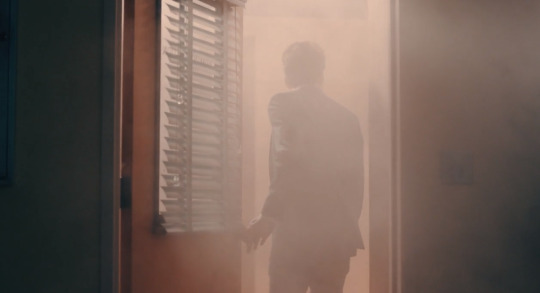
He’s then woken up, there’s faint wind chimes sounds, and he’s surrounded by darkness in a way that feels ethereal. As he exits the room to check the source of the smell that’s almost calling to him, we see nothing but him entering light.
He’s barely visible, surrounded by fog, he can’t see where he’s going very well.
He sees a figure, and asks this:
“Are you in a caterpillar costume?”
When the figure turns to face him, Jack is frightened and runs away.
This immediate association between the very subject he was talking about, and him fleeing in terror, serves to illustrate his true feelings towards what he’s doing by recording this lecture. He’s scared of it, and he’s running away from it.
He wakes up again in the same room as he was before, only this time the light is almost blinding.
Here, Helen appears. This dialogue follows:
Jack: “Jesus, Helen, what are you doing here?” Helen: “Oh, you know I can’t stay away from Whitlock long.”
We quickly find out that this is a dream sequence that Jack is having. Thanks to this knowledge, we know that all the dialogue Jack entertains with the rest of the school workers, all his friends, is nothing more than his internal dialogue manifesting to him through them.
He’s asking himself why he’s at this highschool. The other voice, Helen, replies that it’s because they can’t stay away. They like being here.
But this realization comes with horror and shock to Jack, and so it quickly turns into a graphic, horrid description.
He once again escapes it, going immediately to try recording his lecture again, but Helen bursts into the room kicking the door. All these terrifying thoughts are tormenting him.
He runs away, camera in his hands. Gets interrupted once again.

In this attempt, we are completely unable to see him through the screen because of how out of focus he is to us in there. His attempt at a perfect facade is proving completely infructuous, all we can see is the real Jack, deeply struggling.
He gets interrupted by the three teachers again, and this dialogue happens.
Michelle: “Jack, you’re here! We thought that that video would be done by now.” Jack: “Uh, yeah, unfortunately... it’s not.”
Once again doubt seeps in as he worries about what’s taking him so long, it’s also interesting to notice how the girls use “that that” with no problem whatsoever.
They invite him to join them in playing a game, and he finds himself going along with them at first, before stopping himself, panicked.
Jack: “I don’t have time for your dumb, fun games! I gotta do this video!”
This dialogue sets an intense contrast with the scene with them at the start, in reality.
In that scene, he calls their games “terrible”, then looks at them with fondness.

Here, instead, he’s stressing that he doesn’t have time for it. He wants to participate, as is shown, but he can’t because of his own self imposed obligation.
In other words, this is exposing to him, though still through an horror lense, his realization that he’s gonna miss all these chances to hang out with his friends if he goes through with it.
He keeps running away, and ends up in his class.

His reflection in the screen appears now deeply warped.
The writing on the whiteboard is upside down, something is deeply wrong.
He’s alone, then all of a sudden he’s not, as the camera twists to the side and gets closer.
We are treated to some dutch angles.
He tries again, but the words aren’t even his. He asks if he sounds like Marcus, and the students all nod while creaking sounds can be heard as they do.
Day 2. He’s still eating the same spaghetti as before, and he accidentally gets sauce on his shirt. A stain that just won’t go away. A visible imperfection. He snaps, he covers himself in them, then puts on some makeup powder, helplessly trying to cover it all up. Of course, that does nothing. He’s trying to bury a problem that has become impossible to conceal.
Getting in front of the camera again, he says this:
Jack: “I want this job. I’m so overqualified.”
It’s like he’s trying to convince himself, since he’s not really talking to anyone but a camera lens. Then there’s the part about being overqualified. The thing is, he’s right, and he know he’s right. On a qualification and competence standpoint, he should be able to ace this, no problem. So why is he struggling? Does he want this job?
In comes Durbin.
Durbin: “Jack! ...you’re still here. Working on your video.” Jack: “Yeah uh- but everybody keeps stopping me...” Durbin: “Let’s get you back on the right track. What’s the problem?” Jack: “I got sketty on my shirt...” Durbin: “I’ve got what you need right here. Everything you need is always right in front of you, Jack. Always check the lost and found.”
Lots to unpack here. Everytime Jack encounters someone again, they always comment on how he’s still at school, he hasn’t left. He keeps getting stopped, his subconscious keeps stopping him, since we know this is all a hallucination. He’s going down the wrong path, and Durbin in this situation represents what’s right for Jack, the truth in his subconscious. “Everything you need is in front of you”.
Additionally, the way he explains the problem, speaking like a sad child, makes you feel just how lost he is, just how small he feels. Him feeling small, lost, vulnerable and scared is a huge theme in the entire episode, as you can see.
So he tries again, and this is where we first experience the transition. As Jack is enthusiastic to put on the suit Durbin gives him, we then see that his appearance in the screen is quite different. He looks ridiculous. But in his reality, as his real self, he looks spotless, happy. This is him starting to accept the concept that what he needed was always in front of him. Because whereas the screen just shows us what he wants to present himself as, his facade, the real him shows us his true feelings, how he feels towards this highschool and all his friends and the life he lives here.
By accepting his life as it is, his job at Whitlock, he knows he might end up looking ridiculous and his image may suffer, but inside he feels better, he feels good, happy, realized.
The expression he makes as he sees this suit, is the expression of a man that has found what he was looking for. This is why it emerging from a “lost ad found” box is very significant symbolically.
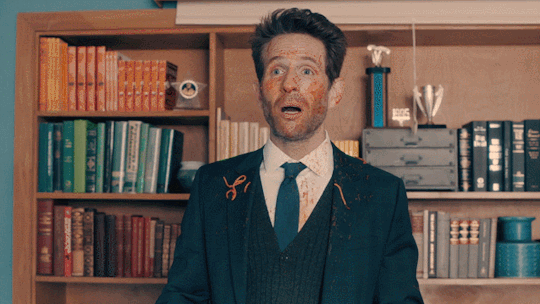
It’s not just himself that changes inbetween “reality” and “screen”, however, it’s the entire location. His background, everything.

He finally finishes his speech, successfully this time. But Helen comes to take the camera and tripod away.
Jack accuses her of “sabotaging him”, but we as the audience will soon come to realize that he’s sabotaging himself.
He runs after her, and as he does, the lights around him start malfunctioning once again.
He opens a door and sees his mother with a young Durbin. He’s understandably unsettled. His mom having always been something close to his heart, we can even see her as a representation of his most intense emotions and of love. He’s struggling to fully come to terms with admitting that he loves being at this school.
He gets away, only to come closer once again once he hears more noises. He opens the door.
He gets in, softly asks for his ipad, and as he walks closer we get an overview of what’s happening. Jack, on his desk, being dissected by his students, completely torn open.
Once again, this visual serves to show Jack’s sense of uncomfortableness with being open and totally vulnerable.
He’s being scrutinized and studied and analyzed all the way to his deepest insides. It’s scary, it’s uncomfortable and it hurts. “I think I found the heart.” “Girl, that’s his bladder.”, he’s being judged mercilessly. That’s how he feels.
“How would we know? We never learned biology.
There’s a sense of guilt for never doing what he should’ve from the very beginning. He regrets not being there for his students, teaching, he’s scared that he’ll never get the chance now that he knows he wants to. This is manifesting though Sarika.
Jack: “I have to go... why are you keeping me from leaving?” Marcus: “We’re not keeping you from anything, Mr Griffin. You’re doing all of this. Your mind has created an entire world of distractions to keep you from doing that video.” Dan: “You know, it’s almost like you don’t want to leave.” Jack: “Yes I do? ...I think I do...”
In this moment, his most open one, he’s finally confronted with his desire to stay.
And this is when he wakes up.
Now back in reality, his appearance in fact resembles the way he looked like in the screen in his mind. So to reiterate, the real him in his mind was simply how he felt, while the screen was the way people see Jack in real life. At this point in the episode, subconsciously, he has come to fully accept it.

He does try to fix up the room, but it’s too much of a mess by now.
We cut to all of his friends discussing together. In comes Helen, with her nose bandage, and she says this.
Helen: “Oh, I’m so glad to see you guys!” Mary: “Helen, what happened?” Helen: “Well, I’m starting to think that the relationship I have with that animal is not what I thought it was.”
This dialogue is meant to reflect Jack’s situation, as do all the subplots in the episode.
The dialogue continues when Helen asks Durbin how it went with his brother.
Helen: “Did you tell your brother that you loved him?” Durbin: “Oh, well, I... kinda sorta chocked on saying that exact phrase, so...” Michelle: “That’s okay Ralph, it’s hard to be vulnerable.” Stef: “Yeah, and you have to respect the fact that he may not be there yet.” Durbin: “Yeah, I just feel kinda bad because a bunch of times he said “I love you” and I said “Yeah, good good good good good”...” Helen: “Well I’m sure he knows how you feel.” Durbin: “Well, at one point he said “Do you love me? Because I can’t tell.” and I said “I don’t know” and I got into a lift and went to the airport, just full choke.”
This all reflects Jack’s own feelings. He’s not quite at a point where he can openly admit to loving his friends and Whitlock, but at the same time this dialogue shows us that they are understanding of it, they know that being vulnerable and open can be very hard, and they’re patient. They do know that Jack loves them.
Enter Dave, in a wheelchair, injured from head to toe.
Dave: “You know who else choked? Maybe the hardest of all?” Everyone: “JACK!!!”
Enters Jack. Everyone cheers his arrival.
Of course, the dialogue just quoted is a joking way to point out how Jack failed in making that recorded lecture.
He shares a cute moment with his girlfriend, and softly says:
Jack: “You were thinking about me...”
It’s like it comes as a surprise to him, that he’s loved, that other people genuinely like him and want him to stay.
He continues.
Jack: “Um, hey, I should talk to you about something. Uh, in fact, I actually have to tell all of you about something important that I realized while you were gone. I realized that-”
He’s interrupted but the janitor which he had previously punched. The guy who was doing the rat disinfestation.
In other words, he chokes, as well.
Mary: “So Jack, what did you learn?” Jack: “Uh... well, I, uh... I invented a new game.”
Instead he chooses to bring that game he hallucinated into reality, making time for it. Being enthusiastic for it.
He enters his classroom.
Jack: “Alright, everybody, shut your precious beautiful mouths. You know after spending an entire week alone in this empty school... I realized that I can’t survive without community. And I came to appreciate... all of you.”
This reflects the trascendalistic philosophical approach of Thoreau, who retreated alone in nature to find true purpose in life.
He goes to write on the whiteboard.

All his previous writing wiped but still visible. He did do all of that, but it’s gone now, it’s no longer present. It’s solved.
Jack: “And I decided that I wanted each of you to finish this year knowing more biology than any student ever has...” Sarika: “Mr Griffin? I know we’ve had our differences in the past...” Jack: “Uh, yeah, hold that thought, Sarika, because the biggest thing that I learned is that prolonged exposure to rodent killing gas causes hallucinations and irrational ideation. And all these things that I thought I learned? Well... chemically induced illusions... caused by a dying brain”
He draws an X on top of the words “community”, “you” and “biology”.
Jack: But! Now... I got my thinker back in the pink. Everything’s back to normal...”
He takes out a bunch of spaghetti and a box of rat poison, sprinkles them heavily with it, and takes a bite like it’s the most normal thing.
So what does it mean, is he rejecting all that he learned? No. He’s keeping up his facade, as being vulnerable is hard, but inside he’s embracing what he learned. This is communicated to us through him ingesting the poisoned spaghetti, going back into his mind, accepting the embarassment and weirdness and going back to that scary feeling of vulnerability for more. He might say that it’s all back to normal, but we clearly see it’s not, and we clearly know that he’s glad to be back and stay back, we see it through his actions.
Ultimately this is a sort of turning point for Jack Griffin, while he might not yet be able to express his feelings, while still going back to a place of denial using the rat poison as the excuse for everything that happened in his brain, this is his first step towards accepting what his subconscious has known all along, his first step to “trascend from a caterpillar into a butterfly”.
This is... trascendentalism, as construed by AP Bio.
#ap bio#glenn howerton#jack griffin#analysis#that that that#ap bio season 3#ap bio season 3 episode 6#yall i cannot believe i just wrote 16 pages of analysis in a single sitting from 3am to 8am#i am literally insane i think#but i hope whoever reads this takes something out of it#glenn howerton if you are reading this i love you buddy youre very talented but please make macdennis canon or i will have to unstan#just kidding im not going anywhere but please bud#does this count as a review#or is this just the ramblings of a crazy person.............#I think I'm right personally#at least somewhat#jack griffin bisexual legend#ok im done i think#when u follow a sunny account for sunny content and then BOOM 16 pages of ap bio analysis#that relatable moment when..........#dont yell at me i know im a mad person but i HAD TO OK
19 notes
·
View notes
Photo

A.P. Bio Season 3 - Episode 6: That That That AirDate: September 3rd, 2020, 03:00 AM
0 notes
Text
DiMA: my dearest faraday
me: *whispers* gayyyyyy
#that did it#ive been suspicious but#that#that that that#okay but at the very least faraday has the biggest crush on dima#i googled and its already a thing so u cant judge me#fallout 4
2 notes
·
View notes
Note
How come you didn't mention Demegawa and Takada?
. . .
. . .
. . .
. . .
What's your point?
0 notes
Text
"James, while John had had "had", had had "had had"; "had had" had had a better effect on the teacher."
"Buffalo buffalo Buffalo buffalo buffalo buffalo Buffalo buffalo"
"He announced that that "that" that that man used in that sentence was unnecessary"
I love English because all of these sentences make sense and that is wonderful.
#buffalo buffalo buffalo#that that that#had had had#language#english#wonderful#i love words#i've gone mad
2 notes
·
View notes
Quote
INTERNAL SCREAMING
me watching the name of the doctor in the living room
0 notes
Video
youtube
Pwede Ako, Gracenote featuring Kean Cipriano
3 notes
·
View notes
Text
we on award tour with tumblr my man
goin each and every place with
the mic in our hands
1 note
·
View note
